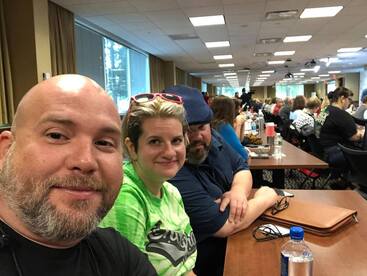 It's time for the third and final installment in my series on some of the common obstacles I face in my writing. Today, I'll attempt to tackle the problem of ghosts - what are they and why do they stop us from writing? What is a Writing Ghost? For me, at least in my writing, a ghost is the specter of my own past success, and just like a "real" ghost, it can come back to haunt my future projects. In truth, it's really just another version of impostor syndrome. If you're unfamiliar with impostor syndrome, you can read about it here. There's also a great story about Neil Gaiman dealing with his own bout of impostor syndrome here. In writing, my personal ghost stems from the ironclad belief that any past success I've enjoyed was achieved almost completely by accident. It's the old anecdote that if a million monkeys sat at a million typewriters working for all of eternity, one of them would eventually write MacBeth. In my mind, I am that monkey (not to compare any of my novels to MacBeth, but you get the idea). I think my success is purely a result of dumb luck. Somehow, by some miracle, I've caught lightning in a bottle, and any hope of repeating that past results is akin to winning the lottery... twice. This particular ghost likes to manifest itself early in any new project. You write a chapter or two, look them over, and are quickly convinced of how terrible your writing truly is. The immediate impulse is to abandon the current novel, wallow in your abject failure, and reconsider even starting any and all future writing projects. How Quickly We Forget. So how do we "bust" our writing ghosts? For me, the best solution came when a friend asked me to give a talk at her school. She asked me if I could share previous drafts of my novel so that her students could see the editing/revision process. Fortunately, I save everything. I quickly dug up my first draft of Kira the Rainbow Princess, and much to my surprise... it was absolutely terrible. I was stunned. How could my novel - my pride and joy - been born from something so incredibly, objectively bad? So often we forget how terrible those early drafts of a novel or story can be, and when we forget that simple fact, we also ignore the truth that half of the skill of writing is found in fixing our own mistakes. Great writers are great because they're flat-out better at finding and correcting their own mistakes. They can hear when a line of dialogue rings false. They see a plot device meandering off into a dead end from a mile away. They have an innate (and ruthless) instinct for when characters, subplots, and chapters - yes, entire chapters - must be brutally wiped from existence. Once is Luck, Twice is Skill. As writers, we must acknowledge the skill of revision. We must give ourselves credit for fixing our own mistakes. And we must finish our novels. There are lessons that can only be learned from finishing a novel - lessons we miss when we start and abandon a project before ever attempting a second draft. At the Rutgers Writers' Conference, Neil Gaiman told the story of a writer who found him one afternoon and asked his advice. She recounted all the steps she had taken to secure an agent and publish her first novel. Nothing had worked. She asked him what she should do next... "Start writing your next book," Neil Gaiman answered. And in those words, is advice for all of us. Writing is a skill. Finishing a novel is a skill. Revision is a skill, and just like every other skill in the world, they all improve with practice. There exists a million reasons NOT to write - including Writer's Block, Guilt, and Ghosts - but more than anything, writing is what we need to do. In the words of Samuel Beckett, "Ever Tried. Ever Failed. No Matter. Try Again. Fail Again. Fail Better." #WriteOn Comments are closed.
|
Archives
June 2020
Categories |

 RSS Feed
RSS Feed